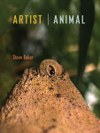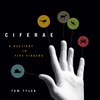Series Editor:
Cary Wolfe
Posthumanities

Posthumanities situates itself at a crossroads: at the intersection of “the humanities” in its current academic configuration and the challenges it faces from “posthumanism” to move beyond its standard parameters and practices. Rather than simply reproducing established forms and methods of disciplinary knowledge, posthumanists confront how changes in society and culture require that scholars rethink what they do—theoretically, methodologically, and ethically. The “human” is enmeshed in the larger problem of what Jacques Derrida called “the living,” and traditional humanism is no longer adequate to understand the human’s entangled, complex relations with animals, the environment, and technology.
About This Book
Books in this Series
 Prosthetic Immortalities
Examining the links between today’s ideas of radical life extension and age-old notions of immortality
Prosthetic Immortalities
Examining the links between today’s ideas of radical life extension and age-old notions of immortality
 Hermes I
For the first time in English, the introductory volume in a major French philosopher’s groundbreaking series of poetic transdisciplinary works
Hermes I
For the first time in English, the introductory volume in a major French philosopher’s groundbreaking series of poetic transdisciplinary works
 Nietzsche’s Posthumanism
A timely and trenchant commentary on the centrality of Nietzsche’s thought for our time
Nietzsche’s Posthumanism
A timely and trenchant commentary on the centrality of Nietzsche’s thought for our time
 Subsurface
A bold new consideration of climate change between narratives of the Earth’s layers and policy of the present
Subsurface
A bold new consideration of climate change between narratives of the Earth’s layers and policy of the present
 Making Sense in Common
A leading philosopher seeks to recover “common sense” as a meeting place to reconcile science and philosophy
Making Sense in Common
A leading philosopher seeks to recover “common sense” as a meeting place to reconcile science and philosophy
 Our Grateful Dead
An award-winning exploration of the presence of the dead in the lives of the living
Our Grateful Dead
An award-winning exploration of the presence of the dead in the lives of the living
 Prosthesis
An examination of the presumed opposition between the natural human body and artificial inanimate objects
Prosthesis
An examination of the presumed opposition between the natural human body and artificial inanimate objects
 Molecular Capture
How computer animation technologies became vital visualization tools in the life sciences
Molecular Capture
How computer animation technologies became vital visualization tools in the life sciences
 Clang
A new translation of Derrida’s groundbreaking juxtaposition of Hegel and Genet, forcing two incompatible discourses into dialogue with each other
Clang
A new translation of Derrida’s groundbreaking juxtaposition of Hegel and Genet, forcing two incompatible discourses into dialogue with each other
 Radioactive Ghosts
A pioneering examination of nuclear trauma, the continuing and new nuclear peril, and the subjectivities they generate
Radioactive Ghosts
A pioneering examination of nuclear trauma, the continuing and new nuclear peril, and the subjectivities they generate
 Gaian Systems
A groundbreaking look at Gaia theory’s intersections with neocybernetic systems theory
Gaian Systems
A groundbreaking look at Gaia theory’s intersections with neocybernetic systems theory
 The Probiotic Planet
Assesses a promising new approach to restoring the health of our bodies and our planet
The Probiotic Planet
Assesses a promising new approach to restoring the health of our bodies and our planet
 Individuation in Light of Notions of Form and Information, Volume II
Unique access to archival material of a major thinker, including presentations, early drafts, and a thorough introduction to the history of the philosophical notion of the individual
Individuation in Light of Notions of Form and Information, Volume II
Unique access to archival material of a major thinker, including presentations, early drafts, and a thorough introduction to the history of the philosophical notion of the individual
 Individuation in Light of Notions of Form and Information
A long-awaited translation on the philosophical relation between technology, the individual, and milieu of the living
Individuation in Light of Notions of Form and Information
A long-awaited translation on the philosophical relation between technology, the individual, and milieu of the living
 Thinking Plant Animal Human
Collected essays by a leading philosopher situating the question of the animal in the broader context of a relational ontology
Thinking Plant Animal Human
Collected essays by a leading philosopher situating the question of the animal in the broader context of a relational ontology
 The Elements of Foucault
A new conceptual diagram of Foucault’s original vision of the biopolitical order
The Elements of Foucault
A new conceptual diagram of Foucault’s original vision of the biopolitical order
 Postcinematic Vision
A study of how film has continually intervened in our sense of perception, with far-ranging insights into the current state of lived experience
Postcinematic Vision
A study of how film has continually intervened in our sense of perception, with far-ranging insights into the current state of lived experience
 Bleak Joys
A philosophical and cultural distillation of the bleak joys in today’s ambivalent ecologies and patterns of life
Bleak Joys
A philosophical and cultural distillation of the bleak joys in today’s ambivalent ecologies and patterns of life
 Variations on Media Thinking
A diverse, enriching volume of media analysis from a pioneering thinker in the field
Variations on Media Thinking
A diverse, enriching volume of media analysis from a pioneering thinker in the field
 Anthropocene Poetics
How poetry can help us think about and live in the Anthropocene by reframing our intimate relationship with geological time
Anthropocene Poetics
How poetry can help us think about and live in the Anthropocene by reframing our intimate relationship with geological time
 Metaphysical Experiments
An engaging critique of the science and metaphysics behind our understanding of the universe
Metaphysical Experiments
An engaging critique of the science and metaphysics behind our understanding of the universe
 Dialogues on the Human Ape
A primatologist and a humanist together explore the meaning of being a “human animal”
Dialogues on the Human Ape
A primatologist and a humanist together explore the meaning of being a “human animal”
 Elements of a Philosophy of Technology
The first philosophy of technology, constructing humans as technological and technology as an underpinning of all culture
Elements of a Philosophy of Technology
The first philosophy of technology, constructing humans as technological and technology as an underpinning of all culture
 Neurotechnology and the End of Finitude
A bold philosophical investigation into technology and the limits of the human
Neurotechnology and the End of Finitude
A bold philosophical investigation into technology and the limits of the human
 Life
A paradigm-shifting genealogy of biological life as metaphysical concept rather than a scientific category
Life
A paradigm-shifting genealogy of biological life as metaphysical concept rather than a scientific category
 Bioaesthetics
A comprehensive critique of the ideas behind bioaesthetics, and a necessary, methodical account of both its insights and its deficiencies
Bioaesthetics
A comprehensive critique of the ideas behind bioaesthetics, and a necessary, methodical account of both its insights and its deficiencies
 Of Sheep, Oranges, and Yeast
Refocusing our lens on literature and history to lives beyond the human
Of Sheep, Oranges, and Yeast
Refocusing our lens on literature and history to lives beyond the human
 What Would Animals Say If We Asked the Right Questions?
A provocative challenge to the marginalization of “humanlike” aspects of animal life
What Would Animals Say If We Asked the Right Questions?
A provocative challenge to the marginalization of “humanlike” aspects of animal life
 Manifestly Haraway
Breaking down the binaries: two manifestos and a conversation on dogs and cyborgs, the implosion of technology, and human and nonhuman beings
Manifestly Haraway
Breaking down the binaries: two manifestos and a conversation on dogs and cyborgs, the implosion of technology, and human and nonhuman beings
 Neofinalism
The masterwork of an influential French philosopher, available in English for the first time
Neofinalism
The masterwork of an influential French philosopher, available in English for the first time
 Necromedia
An unusual answer to a common question: Why does technology play such a powerful role in our culture?
Necromedia
An unusual answer to a common question: Why does technology play such a powerful role in our culture?
 Cinders
A haunting work of poetic self-analysis that finds in the fragility and resilience of ashes a paradigm for the relation of language to the living and the dead
Cinders
A haunting work of poetic self-analysis that finds in the fragility and resilience of ashes a paradigm for the relation of language to the living and the dead
 Humanesis
A search for acoustic resonance leads to an important new critique of posthumanist studies
Humanesis
A search for acoustic resonance leads to an important new critique of posthumanist studies
 Artist Animal
A provocative exploration of the work of contemporary artists who engage with questions of animal life
Artist Animal
A provocative exploration of the work of contemporary artists who engage with questions of animal life
 Alien Phenomenology, or What It’s Like to Be a Thing
A bold new metaphysics that explores how all things—from atoms to green chiles, cotton to computers—interact with, perceive, and experience one another
Alien Phenomenology, or What It’s Like to Be a Thing
A bold new metaphysics that explores how all things—from atoms to green chiles, cotton to computers—interact with, perceive, and experience one another
 Against Ecological Sovereignty
Links the political critique of sovereign power with ecological concerns
Against Ecological Sovereignty
Links the political critique of sovereign power with ecological concerns
 Animal Stories
How cross-species companionship is figured across a variety of media—and why it matters
Animal Stories
How cross-species companionship is figured across a variety of media—and why it matters
 A Foray into the Worlds of Animals and Humans
The influential work of speculative biology—and a key document in posthumanist studies—now available in a new, accurate English translation
A Foray into the Worlds of Animals and Humans
The influential work of speculative biology—and a key document in posthumanist studies—now available in a new, accurate English translation
 Insect Media
Uncovering the insect logic that informs contemporary media technologies and the network society
Insect Media
Uncovering the insect logic that informs contemporary media technologies and the network society
 Cosmopolitics II
A sweeping inquiry that critiques modern science’s claims of objectivity, rationality, and truth
Cosmopolitics II
A sweeping inquiry that critiques modern science’s claims of objectivity, rationality, and truth
 Cosmopolitics I
A sweeping critique of the role and authority of modern science in contemporary society
Cosmopolitics I
A sweeping critique of the role and authority of modern science in contemporary society
 When Species Meet
Whom do we touch when we touch a dog? How does this touch shape our multispecies world?
When Species Meet
Whom do we touch when we touch a dog? How does this touch shape our multispecies world?
Related News
Spike Art Magazine: Summer Reads
I don’t usually read theory when I’m at the beach but Despret doesn’t write your usual theory.
Bjørn Ekeberg for IAI News: "The Delusions of Cosmology"
The idea that the universe started with a Big Bang is a key tenet of the standard model of cosmology. But that model is a lot less scientific than it’s taken to be.
Journal of Peace Research: "A timely contribution to the on-going nuclear debate"
PRIO Book Notes: Schwab certainly manages to make her readers acutely aware of the relevance of the legacies of the Manhattan Project in the early twenty-first century.
David Wills on New Books in Science, Technology, and Society
A landmark work in posthuman thought that analyzes and explores the human body as a technology, the book promotes the idea that the human body is open to supplementation by artificial addenda that operate both internally or externally and engage it in an unceasing arbitration with the environment.
Leonardo Reviews: Biology in the Grid
Review of Biology in the Grid by Phillip Thurtle




























